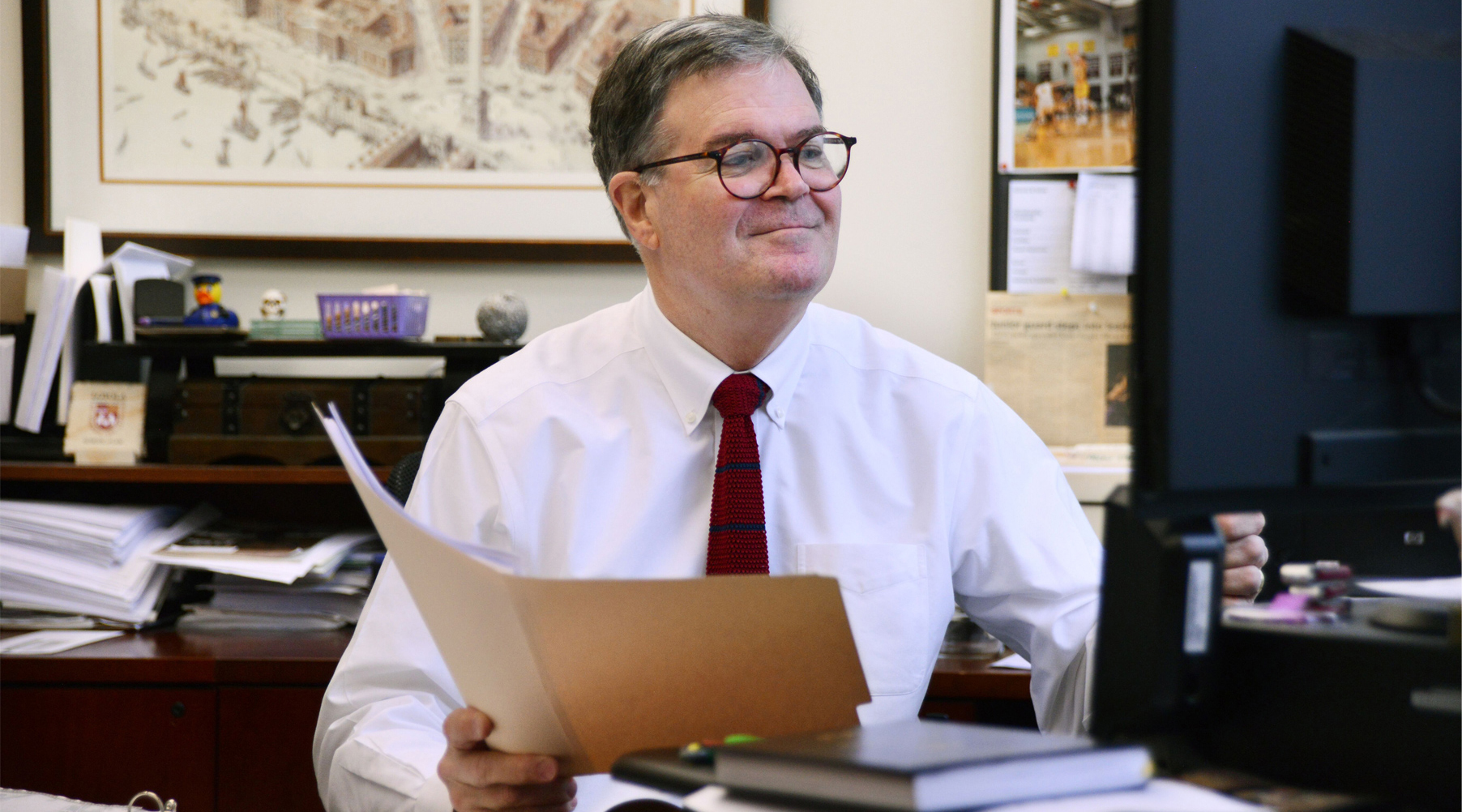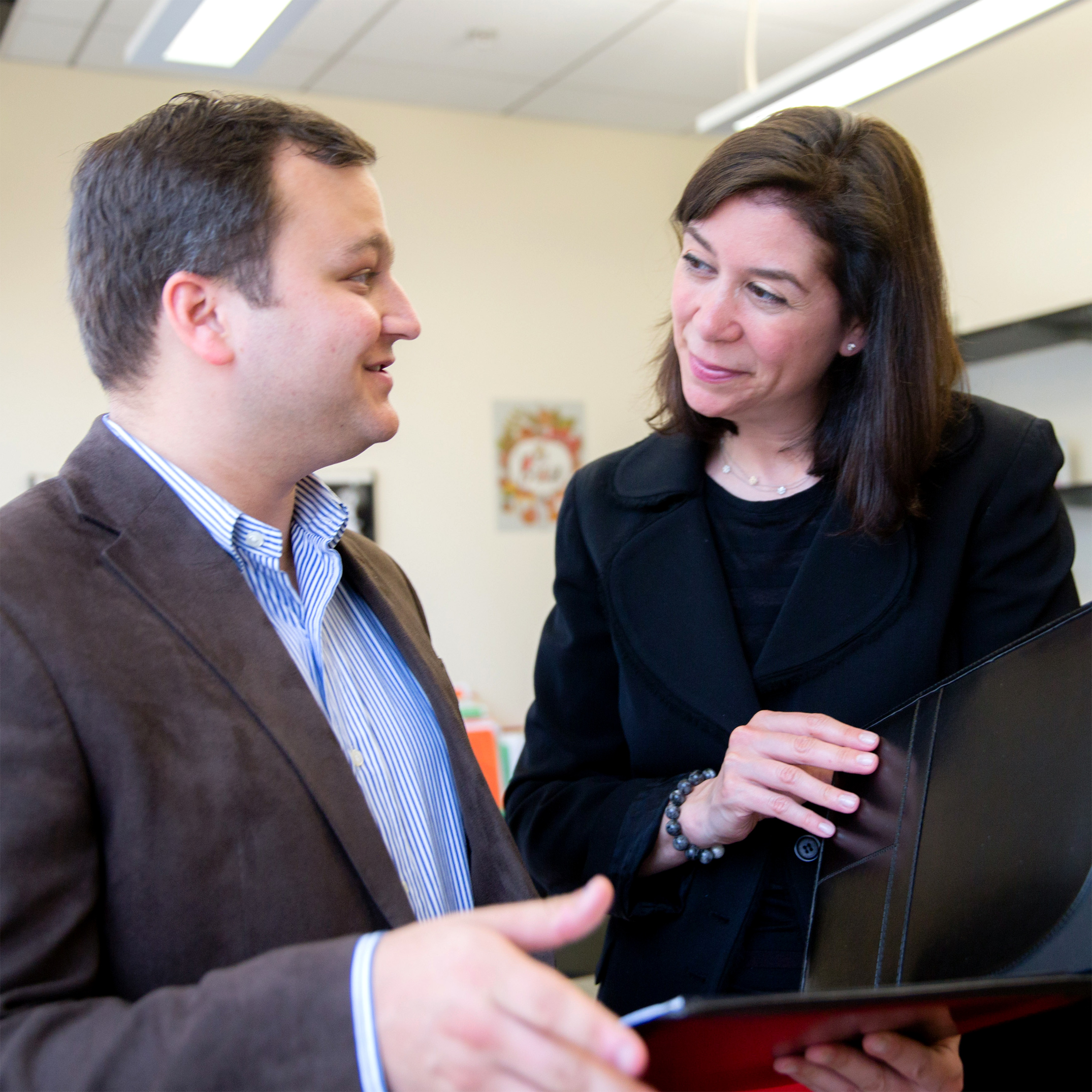FACULTY PROFILE James Faught
Faught’s First 40
Beloved law school administrator James Faught (JD ’76) celebrates quadruple decades at Loyola
IN 1987, FRESHLY RETURNED TO CHICAGO from a ceremony at The Supreme Court of the United States inducting Loyola into the American Inns of Court, School of Law administrator James Faught (JD ’76) got a panicked call from a student.
“It was the time of year when we clean out lockers, and Loyola had emptied hers and thrown away her passport and airline tickets,” Faught recalls. “She was beside herself.”
Eager to help, Faught rushed to the University’s central dumpster, only to learn its contents had just been taken to the city dump. He went home, got gloves, boots, and a rake, and rushed to the dump, eventually finding the student’s precious documents among the flotsam. “In four days in Washington and Chicago, I went from the sublime to the ridiculous,” Faught remembers, laughing.
This no-job-too-odd attitude is emblematic of Faught’s approach to his work. Competent and caring, humble and humorous, Faught—now associate dean for administration—is profoundly admired by the students and alums he’s served and the faculty who have worked alongside him. In 2019, he celebrated his 40th anniversary on the law school administration team.
“In so many ways, Jim is the heart and soul of Loyola’s law school,” says Lisa Madigan (JD’94), former Illinois attorney general and current litigation partner in the Chicago office of Kirkland & Ellis LLP. “His enthusiasm for legal education and attention to students ensure that Loyola law students learn to love the law.”
“I’ve known Jim for over 40 years, first as a student, and then as a beloved colleague,” says Dean Emerita Nina Appel. “For me, he embodies all that we hope our graduates will become. He’s truly ‘a person for others.’ In addition to his intelligence, integrity, and compassion, Jim has an unshakable understanding of justice and fairness.”
From student to staff
A 1976 graduate of the School of Law, Faught says he “never imagined working here until I did—and at first, my classmates were chuckling about the fact that I was hired. I’d had a very positive experience as a student, and all of a sudden these great teachers were my colleagues. Then-dean Bud Murdock pulled me aside and told me, ‘Jim, I want you to call them by their first names. Stop calling them “Professor.’”
The law school was smaller then, and administrators wore more hats. Faught, who served as dean of students for many years, quickly established a reputation as an outstanding listener who gets to know students personally and is deeply invested in their success.
Appel notes that one of the greatest testaments to Faught’s effectiveness is the respect students show for his judgment. “I’ve seen him wrestle with difficult decisions and have watched in some awe as students accepted those decisions, favorable or not, often thanking him for his wise counsel,” she says.
Over four decades, many of the issues facing law students have shifted, and Faught is constantly modifying his communication approach to accommodate an evolving learning environment.
“Our profession is changing. The expense of law school is much greater, career paths aren’t as clear as they were 10 or 15 years ago, and students are under much more pressure,” he says. “Today, students used to being at the top of their classes sometimes have a hard time adjusting to being surrounded by other very high achievers. It’s said that nobody has a bad day on Facebook or Instagram, and that can make it easy for students to think everyone else is doing better than they are.”
“In so many ways, Jim is the heart and soul of Loyola’s law school.”
Learning in London
One of Faught’s premier accomplishments is establishment of the popular London Comparative Advocacy Program, which was offered for the 32nd time in January. “It all started on a whim,” says Faught, explaining that his law school classmate Lorna Propes (JD ’75) had the original idea for a London program. Faught sometimes acted as a courier for DHL, accompanying important documents as they traveled overseas, and he promised then-dean Appel he’d combine a courier trip with an impromptu tour of London courts and legal institutions.
From strong friendships he formed with London legal figures early on, the program has become a fixture of the law school’s winter break. “Our colleagues in London really indulge our students, giving them access to things they’d never see otherwise: visits to the Middle Temple Inn of Court and Old Bailey to observe the courts at work, and meetings with barristers, judges, and court administrators,” Faught says. “They also get to delve into some of London’s incredible history and culture. It’s a wonderful experience every year.”
Service to the profession
As busy as his Loyola work keeps him, Faught has always made time to contribute to the profession through volunteer service.
Since the late 1980s, he’s served on the board of the Illinois Lawyers’ Assistance Program, a nonprofit organization that assists lawyers, judges, and law students with substance abuse, addiction, and mental health issues. The LAP also protects clients from impaired judges and lawyers and educates the Illinois legal community about addiction and mental health.
“The program’s dedication to people’s health and recovery has always been inspiring,” Faught says. “The LAP saves lives, families, and careers, so it feels like holy work.”
In 2004, Faught was appointed by then-Illinois comptroller Daniel Hynes (JD ’93) to serve on the new Illinois Executive Ethics Commission established in the wake of several corruption scandals involving state employees and elected officials.
“The commission was a revolutionary development in Illinois,” Faught explains. “We developed a comprehensive code of ethics and used it to investigate and determine the consequences of various ethical violations that were reported.”
Although his term was set to expire in 2009, Faught was asked to stay on—and ended up spending 14 years on the commission. “During that time, we’ve been able to institute a lot of positive changes, including mandatory ethics training for all employees,” he says.
Staying connected
The number of students Faught has known grows year by year—but he’s a master at staying connected and keeping alums close to their alma mater, so the Faught fan club only increases as time passes.
“Jim works to keep people engaged with Loyola, and lets students and alums know they’re part of a supportive, loving Loyola family,” says Madigan. “He’s much more than an administrator. Jim is a true friend who is always available to answer a question, give advice, or share a story.”
“He’s been an inspirational model for generations of our students and alumni,” adds Appel. “I’m proud to be his friend and to add my thanks to those of so many others.”
Faught, always uncomfortable with praise, demurs by noting that he’s surrounded by other administrators and faculty who are also devoted to humanizing the law school experience.
“It’s been really easy to do what I do,” he says, “when it’s part of the Loyola culture.” –Gail Mansfield
From Loyola Law magazine 2020

